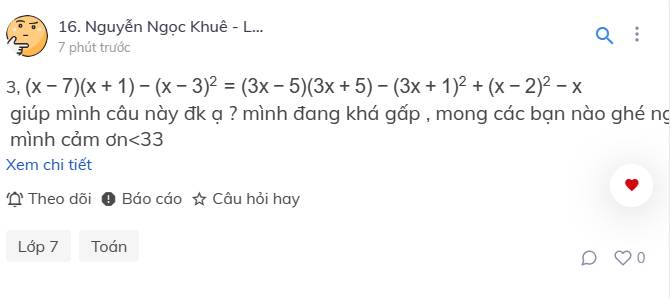Tìm x biết : 5.(x + 4 ) - 3. ( x - 2) = x
giúp mình với, mình đang gấp !
Hãy nhập câu hỏi của bạn vào đây, nếu là tài khoản VIP, bạn sẽ được ưu tiên trả lời.

Đề trước đó:

(x-7)(x+1)-(x-3)^2=(3x-5)(3x+5)-(3x+1)^2+(x-2)^2-x
<=>x^2+x-7x-7-x^2+6x-9=9x^2-25-9x^2-6x-1+x^2-4x+4-x
<=>x^2-11x-6=0
<=>x^2-2x. 11/2 + 121/4-145/4=0
<=>(x-11/2)^2=145/4
<=>|x-11/2|=căn(145)/2
<=>x=[11+-căn(145)]/2

a. \(NT_x=2NT_O=2.16=32\left(đvC\right)\)
\(\Rightarrow NT_x\) là lưu huỳnh S
b. \(3NT_x=4NT_{Mg}=4.24=96\left(đvC\right)\Rightarrow NT_x=96:3=32\left(đvC\right)\)
\(\Rightarrow NT_x\) là lưu huỳnh S
A)
x =2.16 =) x = 32
Vậy nguyên tố x là : Supfur
Kí hiệu : S
B)
4. 24 = 3x =) x = 96:3 =) x=32
Vậy nguyên tố x là : Supfur
Kí hiệu : S

a: P(x)=0
=>4x-7-x-14=0
=>3x-21=0
=>x=7
b: x^2+x=0
=>x(x+1)=0
=>x=0; x=-1


\(3\left(x+2\right)^2-5^2=2.5^2\)
\(\Rightarrow3\left(x+2\right)^2=2.5^2+5^2\)
\(\Rightarrow3\left(x+2\right)^2=5^2\left(2+1\right)\)
\(\Rightarrow3\left(x+2\right)^2=5^2.3\)
\(\Rightarrow\left(x+2\right)^2=5^2\)
\(\Rightarrow\left[{}\begin{matrix}x+2=5\\x+2=-5\end{matrix}\right.\)
\(\Rightarrow\left[{}\begin{matrix}x=3\\x=-7\end{matrix}\right.\) \(\Rightarrow x=3\left(x\inℕ\right)\)
3(x + 2)² - 5² = 2.5²
3(x + 2)² - 25 = 50
3(x + 2)² = 50 + 25
3(x + 2)² = 75
(x + 2)² = 75 : 3
(x + 2)² = 25
x + 2 = 5 hoặc x + 2 = -5
*) x + 2 = 5
x = 5 - 2
x = 3 (nhận)
*) x + 2 = -5
x = -5 - 2
x = -7 (loại)
Vậy x = 3

\(a,\Leftrightarrow\left|x+\dfrac{2}{5}\right|=\dfrac{7}{4}\Leftrightarrow\left[{}\begin{matrix}x+\dfrac{2}{5}=\dfrac{7}{4}\left(x\ge-\dfrac{2}{5}\right)\\x+\dfrac{2}{5}=-\dfrac{7}{4}\left(x< -\dfrac{2}{5}\right)\end{matrix}\right.\Leftrightarrow\left[{}\begin{matrix}x=\dfrac{27}{20}\left(tm\right)\\x=-\dfrac{43}{20}\left(tm\right)\end{matrix}\right.\)
\(b,\Leftrightarrow\left|x-\dfrac{13}{10}\right|=\dfrac{13}{10}\Leftrightarrow\left[{}\begin{matrix}x-\dfrac{13}{10}=\dfrac{13}{10}\left(x\ge\dfrac{13}{10}\right)\\x-\dfrac{13}{10}=-\dfrac{13}{10}\left(x< \dfrac{13}{10}\right)\end{matrix}\right.\Leftrightarrow\left[{}\begin{matrix}x=\dfrac{13}{5}\left(tm\right)\\x=0\left(tm\right)\end{matrix}\right.\)
\(c,\Leftrightarrow\left|\dfrac{3}{4}-\dfrac{1}{2}x\right|=\dfrac{1}{2}\Leftrightarrow\left[{}\begin{matrix}\dfrac{3}{4}-\dfrac{1}{2}x=\dfrac{1}{2}\left(x\le\dfrac{3}{2}\right)\\\dfrac{1}{2}x-\dfrac{3}{4}=\dfrac{1}{2}\left(x>\dfrac{3}{2}\right)\end{matrix}\right.\Leftrightarrow\left[{}\begin{matrix}x=\dfrac{1}{2}\left(tm\right)\\x=\dfrac{5}{2}\left(tm\right)\end{matrix}\right.\)
\(d,\Leftrightarrow\left|5-2x\right|=4\Leftrightarrow\left[{}\begin{matrix}5-2x=4\left(x\le\dfrac{5}{2}\right)\\2x-5=4\left(x>\dfrac{5}{2}\right)\end{matrix}\right.\Leftrightarrow\left[{}\begin{matrix}x=\dfrac{1}{2}\left(tm\right)\\x=\dfrac{9}{2}\left(tm\right)\end{matrix}\right.\)
\(đ,\Leftrightarrow\left\{{}\begin{matrix}x-3,5=0\\x-1,3=0\end{matrix}\right.\Leftrightarrow\left\{{}\begin{matrix}x=3,5\\x=1,3\end{matrix}\right.\left(vô.lí\right)\Leftrightarrow x\in\varnothing\)
\(e,\Leftrightarrow\left\{{}\begin{matrix}x-2021=0\\x-2022=0\end{matrix}\right.\Leftrightarrow\left\{{}\begin{matrix}x=2021\\x=2022\end{matrix}\right.\left(vô.lí\right)\Leftrightarrow x\in\varnothing\)
\(f,\Leftrightarrow\left|x\right|=\dfrac{1}{3}-x\Leftrightarrow\left[{}\begin{matrix}x=\dfrac{1}{3}-x\left(x\ge0\right)\\x=x-\dfrac{1}{3}\left(x< 0\right)\end{matrix}\right.\Leftrightarrow\left[{}\begin{matrix}x=\dfrac{1}{6}\left(tm\right)\\0x=-\dfrac{1}{3}\left(vô.lí\right)\end{matrix}\right.\Leftrightarrow x=\dfrac{1}{6}\)
\(g,\Leftrightarrow\left[{}\begin{matrix}x-2=x\left(x\ge2\right)\\2-x=x\left(x< 2\right)\end{matrix}\right.\Leftrightarrow\left[{}\begin{matrix}0x=2\left(vô.lí\right)\\x=1\left(tm\right)\end{matrix}\right.\Leftrightarrow x=1\)

(x - 3)⁴ = (x - 3)²
(x - 3)⁴ - (x - 3)² = 0
(x - 3)².[(x - 3)² - 1] = 0
(x - 3)².(x² - 6x + 9 - 1) = 0
(x - 3)²(x² - 6x + 8) = 0
(x - 3)²(x² - 2x - 4x + 8) = 0
(x - 3)²[(x² - 2x) - (4x - 8)] = 0
(x - 3)²[x(x - 2) - 4(x - 2)] = 0
(x - 3)²(x - 2)(x - 4) = 0
(x - 3)² = 0 hoặc x - 2 = 0 hoặc x - 4 = 0
*) (x - 3)² = 0
x - 3 = 0
x = 3
*) x - 2 = 0
x = 2
*) x - 4 = 0
x = 4
Vậy x = 2; x = 3; x = 4

\(5^x-2-3^2=2^4-\left(2^8x2^4-2^{10}x2^2\right)\)
\(5^x-2-3^2=2^4-\left(2^{8+4}-2^{10+2}\right)\)
\(5^x-2-3^2=2^4-\left(2^{12}-2^{12}\right)\)
\(5^x-2-3^2=2^4-0\)
\(5^x-2-3^2=2^4\)
\(5^x-2-9=16\)
\(5^x-2=16+9\)
\(5^x-2=25\)
\(5^x=25+2\)
\(5^x=27\)
Bởi vì 27 không phân tích được 1 số có số mũ là 2
\(\Rightarrow\) Không tồn tại x
\(5^{x-2}-9=16-\left(256.16-1024.4\right)\)
\(\Rightarrow5^{x-2}-9=16-\left(4096-4096\right)\)
\(\Rightarrow5^{x-2}-9=16-0\)
\(\Rightarrow5^{x-2}-9=16\)
\(\Rightarrow5^{x-2}=25\)
\(\Rightarrow x-2=25:5\)
\(\Rightarrow x-2=3\)
\(\Rightarrow x=5\)

d: \(\dfrac{x}{x+3}=\dfrac{x^2-3x}{\left(x+3\right)\left(x-3\right)}\)
\(\dfrac{1}{3-x}=\dfrac{-1}{x-3}=\dfrac{-x-3}{\left(x-3\right)\left(x+3\right)}\)
\(\dfrac{1}{x^2-9}=\dfrac{1}{\left(x+3\right)\left(x-3\right)}\)
5.(x + 4) - 3.(x - 2) = x
5x + 20 - (3x - 6) =x
5x + 20 - 3x + 6 = x
2x + 26 = x
2x - x = (-26)
x = (-26)
Vậy x = (-26)
cảm ơn nhìu lắm